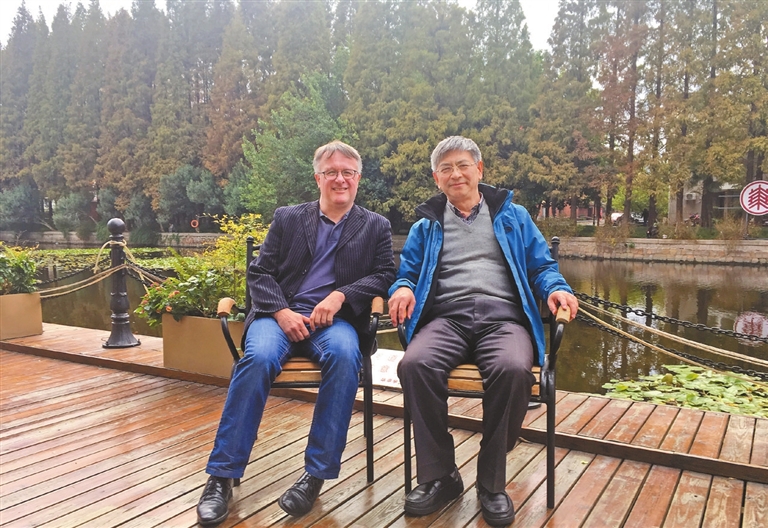
Lin Songtao 254238712@qq.com DR. Jeroen van de Weijer, a linguistics professor from the Netherlands at Shenzhen University (SZU), is very interested in the study of large language models (LLMs) like ChatGPT and DeepSeek. He explores how these models work and how linguists, especially computational linguists, word frequency specialists, and semanticists, contribute to their development. “With students, I have done some research on the automatic translation quality of some of these models,” he said. Enthusiasm for language As a linguist who has also done research on Chinese, van de Weijer’s first contact with the language occurred in 1986. “It was a course on Dutch television called ‘Ni Hao.’ Its popularity was astonishing — more than 10,000 people registered, and extra copies of the textbook had to be printed. It was the first time that China was exposed to the Netherlands in this way.” Van de Weijer attended many language courses in school, including English, German, French, Latin, and Ancient Greek. “I did a course on Russian for two years, Japanese for one year, and learned some Hungarian and Polish by myself. My Dutch is becoming a bit mixed up sometimes.” In the future, he wants to learn Cantonese, which he described as melodious. He finished his Ph.D. in linguistics at Leiden University in the Netherlands, where language studies have a long tradition. After receiving his doctoral degree, he stayed at that university to teach, including in a graduate program that was open to international students. “Chinese students opened up my eyes to the richness that the Chinese language has to offer.” He had a Chinese Ph.D. student, Prof. Zhang Jisheng of East China Normal University, who came to Leiden on a grant to write a prize-winning dissertation on his native dialect — the Shaoxing dialect. “I sometimes work on the Tujia ethnic minority language, and this has also sparked my interest in other ethnic minority languages. Now I have a co-authored paper on Zhuang submitted to an international academic journal. Last year my family and I visited the region where Zhuang is spoken, and it was so interesting.” Enjoying teaching career With research on Chinese, Dutch, and Japanese, he taught linguistics at Shanghai International Studies University for nine years and now teaches in SZU’s BA and MA programs. In 2013, he was awarded the Shanghai Magnolia Silver Award, which recognizes outstanding expats for their contributions to Shanghai’s economic construction, social development, and foreign exchanges initiated by the Shanghai Government. “For us foreigners, the process is a complete surprise. This award also made me eligible for a later meeting — a workshop with selected expats and President Xi Jinping. I will always remember the open dialogue with the expats. It showed me the value of constructive conversations among people from different parts of the world. There is nothing more important than the network you are part of,” he said. Before he started teaching in Shenzhen in 2018, van de Weijer had visited the city in 2007 to present a lecture at SZU. “When a friend mentioned this opportunity, I was surely interested. I also thought it would be good to change and teach different courses, meet other students and colleagues, and pursue some other research.” SZU is not only where van de Weijer teaches but also lives. “I love the lychee and other fruit trees!” He thinks that his college, the College of International Studies, is well-organized. “This year, the college will enroll PhD students, and I’m looking forward to that. Having a Ph.D. program gives a special atmosphere to SZU.” Van de Weijer was impressed by Shenzhen’s transportation system and emphasis on education. “As a Dutchman, I prefer biking. I bike wherever I can, whenever I need, and Shenzhen has done well with bike lanes in many places.” Linguistics in the AI age Talking about the influence of artificial intelligence in education, van de Weijer commented, “I always think that linguistics is a very good practical choice for students, as long as you combine it with other courses such as law or social science. And there are many other interesting aspects of linguistics like animal communication and neurolinguistics, which teach us more about ourselves as the human species.” Ten years ago, with two brilliant French and Chinese programmers, van de Weijer worked on a language app that could rate English speech in real time. “Duolingo, which didn’t exist at that time, offers pretty good word learning, sentence, listening, and writing practice. It only lacks a speaking part. When learning a language, speech practice is one thing you will definitely need. It could have been a perfect combination.” “LLMs can have a huge impact on education. Teachers are engaging in LLM ethics discussions, and I hope this will lead to meaningful progress,” he said. | 
